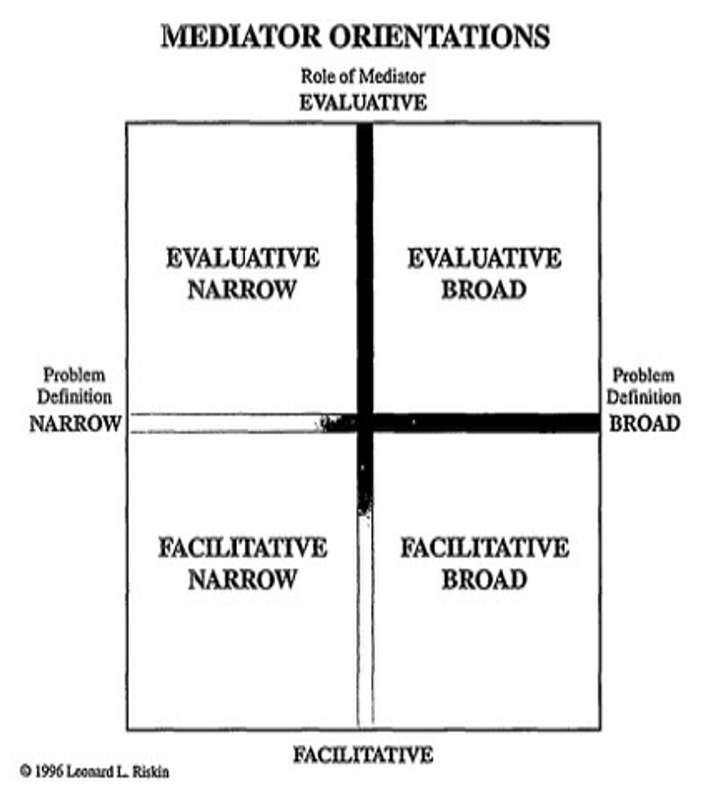Riskin’s Grid: Do You Need a Facilitator or an Evaluator?
Thu, Jun 24th, 2021 | by Miles Mediation and Arbitration | Article | Social Share
Leonard Riskin is a renowned law professor and ADR scholar who taught at the University of Missouri during the ‘90s. During this time, Professor Riskin set out to observe mediations and write about the work of people who call themselves “mediators.” The result is what has been called “Riskin’s Grid” or “Riskin’s Grid of Mediation Techniques.”
According to Riskin, there are two continuums where mediators function. First, he wrote that mediators ranged from being “facilitative” mediators to being “evaluative” mediators. Second, he said that mediators ranged from defining the problem “narrowly” to defining the problem “broadly.” He illustrated his observations on in a grid that, while it has evolved over time, generally looks like the diagram below.
As for the difference between a “broadly” defined problem and a “narrowly” defined problem, well, I’ll write about that later. For now, I want to address an evaluative mediator vs. a facilitative mediator.
At first blush, you might think of an evaluative mediator as a classic “arm twister.” By contrast, some would say that a facilitative mediator is a more passive neutral who keeps their opinions to themselves. This, however, is far too simplistic.
I believe that a skilled mediator can (and should) function anywhere along Riskin’s Grid. The key, in my view, is for a mediator to determine where he or she needs to function at any given time.
For example, an insurance adjuster who has been through a million mediations might want a mediator who will share their views very early in the process. In other words, this negotiator may want a mediator who functions strictly at the top of the grid.
A general counsel may be firm in their own evaluation of a case and may refuse to engage with a mediator who tries to share their views. This person will want a mediator at the bottom of the grid.
A victim of sexual assault may need to be heard and validated before they are willing to negotiate. This person may need a mediator who functions at the bottom of the grid early in the mediation and then becomes more evaluative once they have earned a party’s trust.

The attitude of your client is important in each of these situations. During a mediation, the mediator will often explore how evaluative or facilitative they need to be. It’s important for lawyers to remember that they know their client far better than the mediator does. One of the most important things you can do for your client in preparing for a mediation is to consider what mediation techniques will be helpful. Sharing those views with the mediator in advance of the mediation will go far in helping the mediator properly manage the negotiation. In other words, help the mediator understand where on Riskin’s Grid they need to function.
ABOUT MICHAEL RUSSELL
 Michael Russell is a Nashville-based mediator and arbitrator with a national reputation. He is a member of the National Academy of Distinguished Neutrals and has been listed in Best Lawyers in America, Mid-South Super Lawyers, Top 100 Lawyers in Tennessee, and Top 50 Lawyers in Nashville. He is rated “AV Preeminent” by Martindale Hubbell and is a two-time recipient of Best Lawyers’ “Nashville Lawyer of the Year” Award.
Michael Russell is a Nashville-based mediator and arbitrator with a national reputation. He is a member of the National Academy of Distinguished Neutrals and has been listed in Best Lawyers in America, Mid-South Super Lawyers, Top 100 Lawyers in Tennessee, and Top 50 Lawyers in Nashville. He is rated “AV Preeminent” by Martindale Hubbell and is a two-time recipient of Best Lawyers’ “Nashville Lawyer of the Year” Award.

